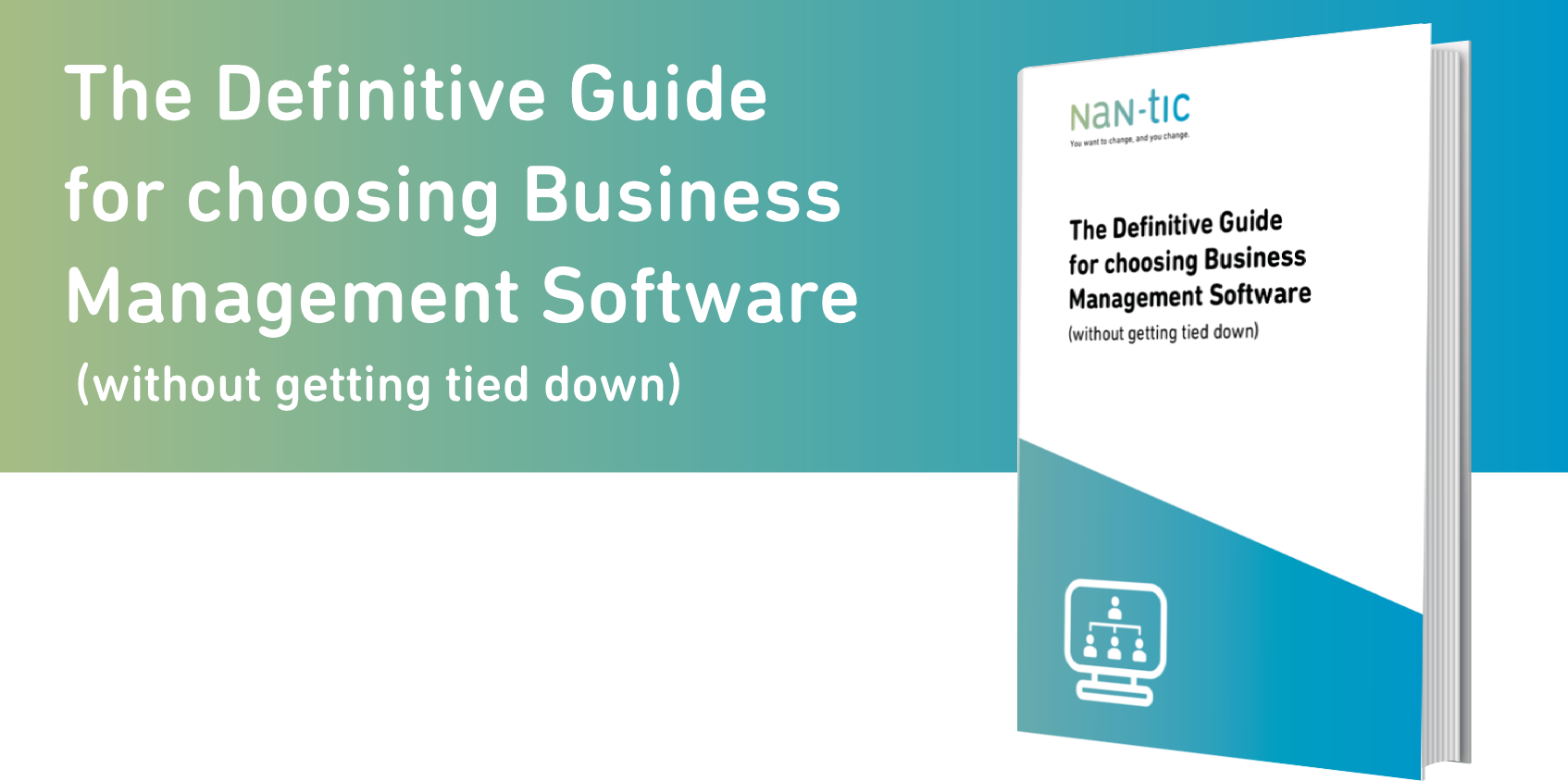The Definitive Guide for Choosing Business Management Software - CHAPTER 9
NaN-tic Dec 1, 2018
CHAPTER 9 - THE GENERAL MANAGER OPINION
SUMMARY:
The person who decides how a company works can not be left out of the decision of the tool that will make it work. This obviousness is sometimes not taken into account, and the results are not recommended. It is necessary that the general management establish some strategic criteria that help discard options and reaffirm the final decision.
KEY IDEAS:
- What do you want an ERP for? This initial question is basic to establish criteria for selecting the tool.
- As important as choosing the software properly is choosing the provider. We explain why.
- Given two possibilities without major technological or economic differences, always prioritize good tuning with who has to install it.
The General Manager
We’ll start off here by assuming that your General Manager is the person who possesses an overall strategic vision of the company. And in a modern company the main tool that helps to make the company work cannot be considered to be a marginal topic. In fact, the selection of one tool or another has a clear strategic component, with respect to how the company plans its actions in the coming months and years. Improving the company in a technological manner, in order to begin exportation is not the same as opening new sales points. Forecasting low-scale, sustained growth is not the same as an important quantum leap resulting from a purchase or an injection of capital.
Having said that, the General Manager often does not have the time (nor often the energy) to follow the entire process closely. Despite this, our experience has led us to recommend that the General Manager should take part in the definition of the basic internal guidelines, that he should supervise the evaluation process of the different alternatives available and be involved in the final decision.
By way of example, here are some questions, which in our opinion should be made by the General Manager in order to make more appropriate decisions:
- Is there any problem with the data being outside the company?
- Is a more expensive, but non-open source option being prioritized, or is emphasis being given to one that is cheaper, but more flexible?
- What supplier profile are you looking for? Brand or close-at-hand?
- Do you prefer to subcontract developments made, or do you trust your own IT staff?
- What economic and contractual links are you willing to accept?
As it can be seen, all the major questions focus on a central point; the relationship with the supplier. It has been said that choosing a supplier, or partner (as they are referred to in the sector) is like getting married. It is an important step that establishes a long-term link, and all too often one that is stronger than expected.
If we insist on the idea that the selection of a tool is a critical moment in the history of a company, it is because you cannot take it back after a few days. And then it will be too late to read this guide. Purchasing an ERP and linking yourself to a supplier must be made from the position of having properly analysed all the viable proposals on the market, and from the conviction that the supplier is honest, open and professional.
Here we need to stress the need to be frank and direct in your negotiations. What sense would it make if you told your supplier that you have severe budget restrictions, if later you give him access to all your accountancy data? What logic would establishing a determined negotiation strategy have if the supplier later enters the company and you tell him how your purchasing process works? What sense is there in requesting assessment from someone when you are unwilling to explain everything to them? A relationship of trust is essential and it must exist for both parties. However good the product is, or the expert’s references, if there is a lack of trust, there are major risks. Think about going for a coffee with your supplier, before making a decision you might regret.
Furthermore, you must remember that you will find companies of all kinds during the installation process, from those that document nothing and hardly explain a thing to you, to those who document everything. Here is another important point: the rigorous documentation of requirements does not necessarily guarantee the success of the project. And it is highly unlikely that users understand absolutely all the details of the new tool just by reading a document. There will always be misunderstandings, so a middle way is probably preferable, i.e. to neither begin things without knowing what you’re doing, nor wait until you have everything documented before you begin; detailed total documentation would be better for the installer than for the client, as having everything laid out in writing gives him room to say “we didn’t anticipate this point”.
And here you have TIP NUMBER 5: When faced with two options without too many economic or technological differences, prioritize harmony and complicity with your program installers and it will be more difficult to make mistakes.
PREVIOUS CHAPTERS
CHAPTER 8: The Financial Manager opinion
CHAPTER 7: CTO opinion is a must
CHAPTER 5: Is open source the best option? Not necessarily, but you should always count on it
DO YOU WANT TO DOWNLOAD THE GUIDE?

